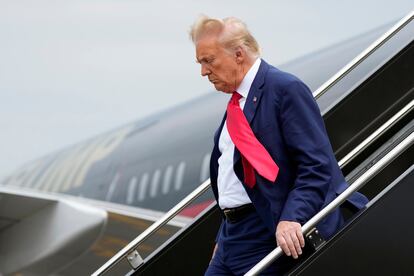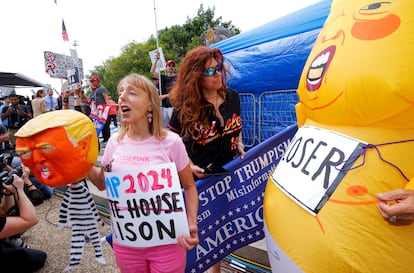Trump pleads not guilty to charges that he conspired to overturn 2020 presidential election
The former president and current Republican presidential candidate is charged with four crimes, including conspiracy to defraud the United States and conspiracy against rights


Donald Trump is getting the hang of appearing before a judge. On Thursday, he stepped inside a court for the third time in four months, and, this time without having his lawyer speak for him, he declared himself, vociferously and on his feet, “not guilty” to charges that he conspired to overturn the result of the 2020 presidential election. It is the most explosive case of the three he is facing. He entered the not guilty plea in the most symbolic place possible: a federal court in the nation’s capital, in full view of the U.S. Capitol where American democracy lived its darkest hour on January 6, 2021, when a mob of his supporters stormed Congress in an attempt to prevent the formal confirmation of Democrat Joe Biden’s victory.
This time around, Trump wanted to convey that he was relaxed. The former president appeared before Judge Moxila Upadyaha to confirm data such as his name and age (77 years old) and, with the pout that is part of his trademark image, listened with his arms crossed to the reading of the four charges against him brought forth by Special Counsel Jack Smith: conspiracy to defraud the United States, conspiracy to obstruct an official proceeding, obstruction of and attempt to obstruct an official proceeding, and conspiracy against rights.
Judge Upadyaha reminded him that the charges could carry up to 50 years in prison. When the judge asked him to comment on the charges, he stood up and, without resorting to a microphone, simply projecting his voice into the courtroom, responded, “Not guilty.” A few feet away, Smith stared impassively at him.
The former president left for the airport immediately after the end of the arraignment. The judge has given the government seven days to submit a report on the possible duration of the trial.

Trump and his team have repeatedly tried to delay his series of trials. Each court appearance has given him a boost in the polls, making him the lead contender for the Republican nomination. The former president has opted for a strategy in which he casts himself as a victim of a politicized judicial system, in which the powers that be are aligned against him to prevent his return to the White House. Basically, he wants to use the American people’s vote to distract the prosecutors and judges. He has hinted that, should he be elected president in 2024, he would acquit himself and put an end to all his pending cases.
His tactic is working, at least for the moment. Polls predict a tie between him and President Biden. And they put him at a distance of more than 30 percentage points over his immediate Republican rival, Florida Governor Ron DeSantis. His false allegations that the November 2020 election was rigged are now gaining traction among Republican voters: 68% say Biden won in 2020 “due to voter fraud,” according to polls.
The next hearing will take place on August 28, according to the judge. The case now passes into the hands of another judge, Tanya Chutkan, who has previously stood out as one of the toughest punishers of rioters who stormed the U.S. Capitol in January 2021.
Trump’s not guilty plea did not come as a surprise. The former president categorically denies having committed any wrongdoing, in this case and in the other two that he is also facing: in New York, he was accused in New York of falsifying business records in connection with payments to allegedly buy the silence of porn actress Stormy Daniels over an extramarital affair, which Trump denies, and in Miami, where Smith charged him with 37 counts of illegally possessing classified material after leaving the White House.
Formal processing and fingerprinting
Before today’s hearing, Trump left his private golf club in Bedmister, New York to travel to Washington in his private plane. His appearance was scheduled for 4 p.m. But he arrived early at the courthouse in a motorcade and headed immediately for a procedure he is beginning to know well: his formal detention and fingerprinting, the step prior to the arraignment presided by Upadyaha on the second floor of the courthouse.
In filing his indictment on Tuesday, Special Counsel Smith indicated that he would seek a speedy trial, a promise he has also made in the Mar-a-Lago classified documents case. But it is not clear whether he’ll be able to do that with such an unprecedented case: never before has a former U.S. president faced criminal charges. It is a case that touches on the most basic values of the American political system, democracy and the rule of law. And it forces the U.S. political class to look in the mirror and ask: how was the assault on the U.S. Capitol possible? And how could it be possible for a sitting president to falsely claim — and continue to do so even after his departure from office — that a national election was rigged?
“What we want is a just trial, not simply a speedy trial,” one of Trump’s lawyers, John Lauro, said Thursday in an interview with NPR public radio. “There’s no need to railroad any defendant in the United States. And we’re hoping the Justice Department will recognize that justice is more important than speed.”
Lauro noted that months of preparation will be needed for the trial of a case that has taken nearly three years to investigate, in response to questions about whether the trial could be heard before next year’s November elections. “We’ll be litigating a case of unprecedented magnitude. I’ve been involved in large white collar cases for many years, over 40 years of practicing law, [and] this is going to be one of the biggest cases in the history of the United States,” he said. The idea of a speedy trial is “absurd,” he added.
Washington is hostile territory for Trump. In 2020, 92% of the city’s voters supported Biden; only 4% favored the Republican. The city’s distaste for him, evident throughout his four years in the White House, was evident again Thursday.

The night before the arraignment, police erected fences and barriers to block traffic around the courthouse. A large number of vehicles and agents of the Secret Service and local police patrolled the area in anticipation of disturbances. But in front of the courthouse, the only people crowding around were the dozens of journalists who had gathered there since early in the morning. Unlike in New York and Miami, where Trump’s followers turned out to support him, in D.C. they were almost completely absent.
More numerous were the demonstrators demanding the imprisonment of the Republican hopeful. One person went so far as to dress like a giant baby version of Trump crying at the prospect of going to prison. In front of the main entrance to the court, Dominic Santana repeated what he had already done in Miami, and, dressed as a prisoner, held up a large photograph of the accused, bald and wearing an orange jumpsuit, chanting “Lock him up!”
Washington, hostile territory
The lack of affection between Washington and Trump goes both ways. The former president and his legal team consider D.C. to be hostile terrain, so they believe that their chances of a fair trial are reduced, and have proposed instead that the case be taken to West Virginia, a nearby state and where the former president scored two-thirds of the total votes in the elections three years ago. “Unfair venue, unfair judge,” Trump posted on his social network, Truth Social.
Prior to the actual trial, it is likely that several pre-trial hearings will be held to resolve procedural issues: from the type of evidence that may be admissible, to the witnesses to be called, among other issues. The trial itself will also be lengthy: numerous witnesses are expected to appear, including former Vice President Mike Pence — whose testimony is one of the bases of the indictment — and possibly at least some of the six people included in the indictment as Trump’s co-conspirators.
The trial may end up sparking an important debate on the First Amendment of the U.S. Constitution, which defends freedom of speech. Special Counsel Smith is basing his allegations against Trump in large part on the former president’s own statements, who publicly claimed time and time again that he was the real winner of the 2020 election. The Republican’s lawyers consider that it was simply the opinion of the then-president, which is protected by said amendment. The key may be to prove that the Republican knew he had been defeated and was lying in the hope of reversing the result and remaining in power.
Sign up for our weekly newsletter to get more English-language news coverage from EL PAÍS USA Edition
Tu suscripción se está usando en otro dispositivo
¿Quieres añadir otro usuario a tu suscripción?
Si continúas leyendo en este dispositivo, no se podrá leer en el otro.
FlechaTu suscripción se está usando en otro dispositivo y solo puedes acceder a EL PAÍS desde un dispositivo a la vez.
Si quieres compartir tu cuenta, cambia tu suscripción a la modalidad Premium, así podrás añadir otro usuario. Cada uno accederá con su propia cuenta de email, lo que os permitirá personalizar vuestra experiencia en EL PAÍS.
¿Tienes una suscripción de empresa? Accede aquí para contratar más cuentas.
En el caso de no saber quién está usando tu cuenta, te recomendamos cambiar tu contraseña aquí.
Si decides continuar compartiendo tu cuenta, este mensaje se mostrará en tu dispositivo y en el de la otra persona que está usando tu cuenta de forma indefinida, afectando a tu experiencia de lectura. Puedes consultar aquí los términos y condiciones de la suscripción digital.








































